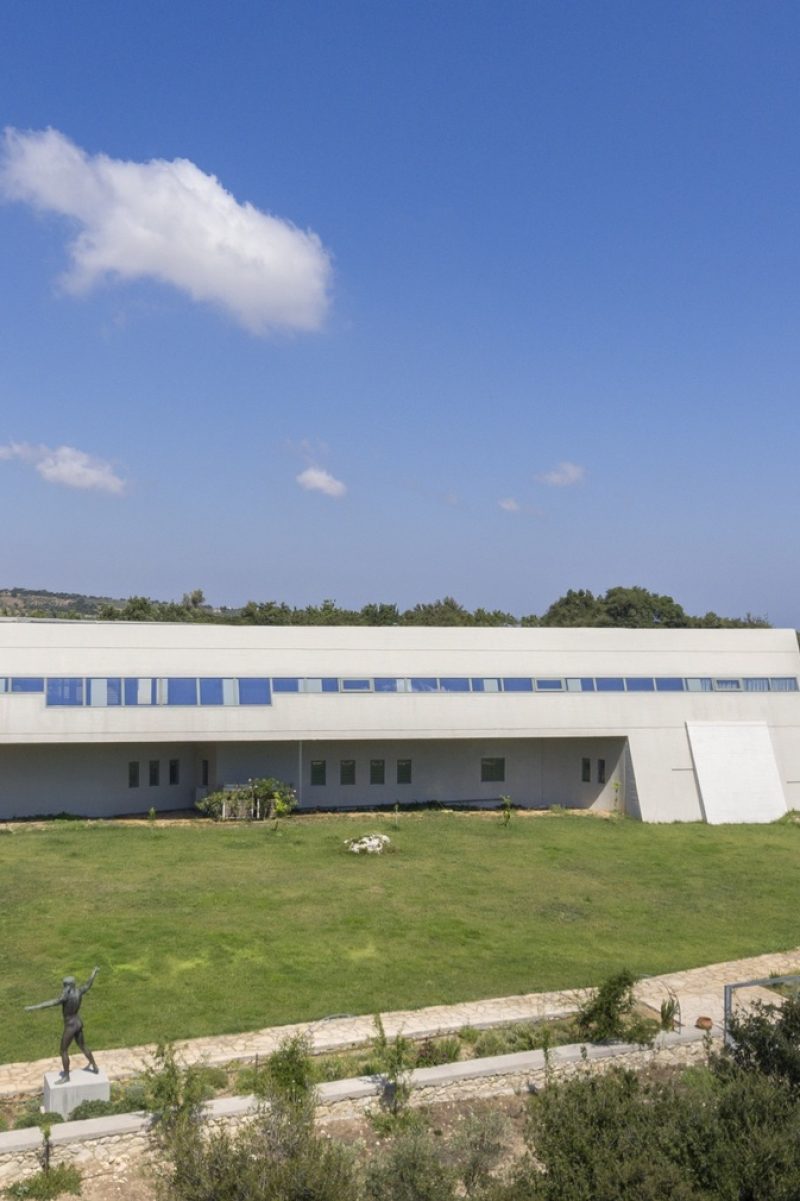

12°C
The Museum of the Archaeological Site of Eleutherna – “Homer in Crete” is a unique example of the connection between myth and archaeological reality. It is one of the four museums of the University of Crete and the first archaeological site museum in Crete. It houses the valuable findings of the systematic excavations that have been carried out in the area for more than thirty years under the supervision of the University of Crete and Professor Nikolaos Stambolidis. The building of the museum (inaugurated in 2016) is an impressive example of modern architecture and museological approach, fully in harmony with the natural landscape of Crete, reminiscent of a “stone ship” anchored in the green landscape.
Among its most important exhibits is a bronze shield of the type of Idaeus Antros, a rare work of early Cretan art that recalls the heroic world of Homer. Also important are the findings from the tomb of the “warriors”, such as the stamnos and the Phoenician flask, which were linked to ancient traditions and references of Herodotus. The excavation of the famous funeral pyre LL, which confirms scenes from the Iliad, is one of the most important reasons to visit the museum.
The permanent exhibition is divided into thematic sections covering public life, religion, burial practices, social structure and artistic expression of the inhabitants of ancient Eleutherna. On display are jewelry, inscriptions, figurines, everyday objects and unique examples of style, such as the statue directly related to the Lady of Hosier in the Louvre Museum. Visitors can follow the evolution of techniques and materials, from obsidian and clay to ivory and gold.
The museum is surrounded by innovative audio-visual applications, educational programs and re-enactments, and is located in a unique archaeological park with cobbled paths, rest areas and a botanical garden with endemic Cretan plants.
*The photos are sourced from the museum’s official website and the Ministry of Culture.
Museum
Archaeological
Eleftherna Mylopotamos, Rethymnon
+32 834092501
Wednesday – Sunday: 08:30 – 15:30
For the Rural Greece accessibility is fundamental to enhancing an inclusive tourism experience. Following the principles of inclusion and equality, the epaithros Rural Tourism Network and its member businesses are constantly working to enhance the tourism services provided, ensuring that all visitors have the opportunity to experience the authentic beauty of the Greek countryside.
Sustainability in tourism refers to a way of developing tourism that respects and protects the environment while strengthening the local economy and preserving cultural traditions. The aim of sustainable tourism is to provide unique and authentic experiences for visitors without harming the natural and social environment, while ensuring that local communities benefit from tourism activity.
This type of tourism is based on three pillars:
With sustainable tourism, visitors can have authentic experiences, knowing that the impact of tourism on the region is positive and lasting for future generations.
For Rural Greece, localism is one of the most important factors for the development of sustainable tourism, as it promotes a strong link between the tourism product and the local society, economy and culture. Through localism, visitors get the opportunity to explore authentic elements of the destination, such as local products, traditions and culture. This not only boosts the local economy, but also helps to sustain and strengthen local businesses, creating new jobs and supporting the development of local communities.
Furthermore, localism contributes to the sustainability of the tourism sector, as it reduces the use of resources from other regions and encourages the use of local goods and services, reducing the ecological footprint of tourism activities. Thus, integrating localism into tourism practices enhances sustainability awareness, both among visitors and local businesses, creating a more responsible and sustainable tourism destination.